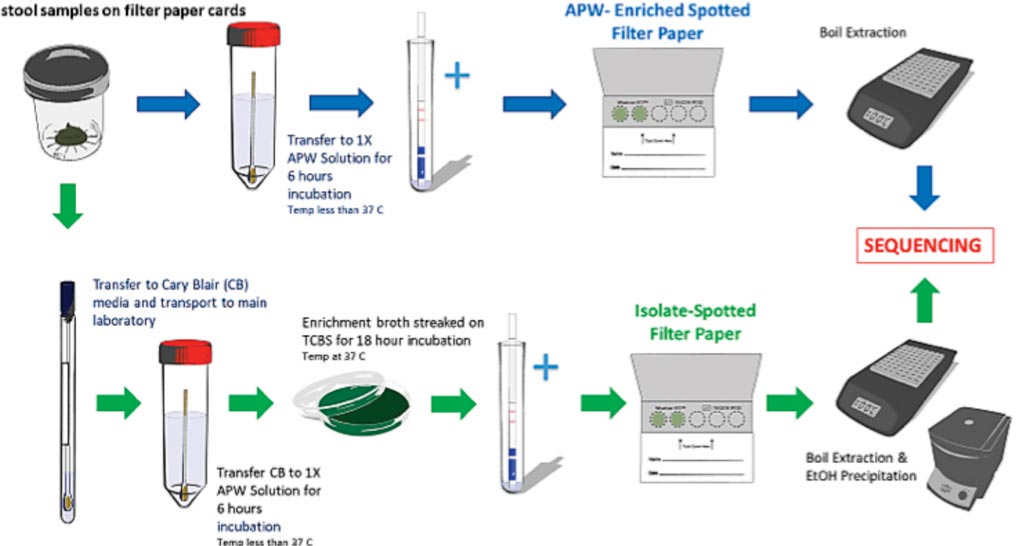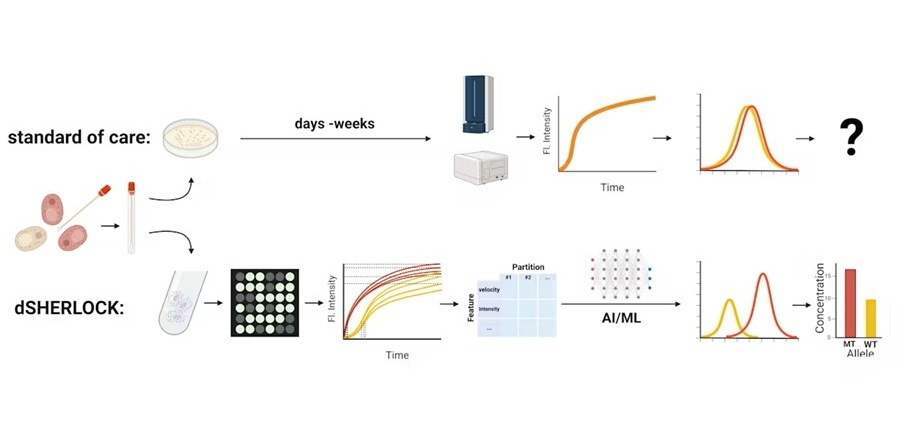Cholera Diagnosed from Dried Spotted Filter Paper
By LabMedica International staff writers
Posted on 20 Jun 2019
Cholera outbreaks can rapidly induce high death tolls by overwhelming the capacity of health facilities, especially in remote areas or areas of civil unrest. Global estimates for cholera annually approximate four million cases worldwide with 95,000 deaths.Posted on 20 Jun 2019
Stool specimens preserved on filter paper facilitate molecular analysis of Vibrio cholerae in resource-limited settings. Specimens preserved in a rapid, low-cost, safe and sustainable manner for sequencing provides previously unavailable data about circulating cholera strains.

Protocol summary of Vibrio cholerae DNA harvest from specimens preserved on filter paper cards (Photo courtesy of Wellcome Trust Sanger Institute).
An international team of scientists led by the Wellcome Trust Sanger Institute (Hinxton UK) tested Cameroonian stool specimens from 65 patients that were positive for V. cholerae by Crystal VC dipstick kit (Arkray Healthcare Pvt Ltd., Surat, India). Of these specimens, only 16 were processed according to two different protocols, called hereafter APW-enriched specimen spotted filter paper and culture-isolate spotted filter paper.
For APW-enriched specimen and culture isolate spotted on filter papers, a single spot of filter paper was excised and processed. The presence of V. cholerae was confirmed via multiplex polymerase chain reactions (PCRs) first targeting an outer membrane protein, OmpW, in combination with primers targeting cholera toxin A, ctxA. A second PCR confirmed the presence of the rfb gene specific for the O1 serogroup. Whole genome sequencing (WGS) was performed on a HiSeq 2500 platform (Illumina, San Diego, CA, USA) to generate 100 bp paired-end reads.
The scientists reported that WGS recovered close to a complete sequence of the V. cholerae O1 genome with satisfactory genome coverage from stool specimens enriched in alkaline peptone water (APW) and V. cholerae culture isolates, both spotted on filter paper. The minimum concentration of V. cholerae DNA sufficient to produce quality genomic information was 0.02 ng/μL. The genomic data confirmed the presence or absence of genes of epidemiological interest, including cholera toxin and pilus loci. WGS identified a variety of diarrheal pathogens from APW-enriched specimen spotted filter paper, highlighting the potential for this technique to explore the gut microbiome, potentially identifying co-infections, which may impact the severity of disease. WGS demonstrated that these specimens fit within the current global cholera phylogenetic tree, identifying the strains as the 7th pandemic El Tor.
The author concluded that WGS results allowed for mapping of short reads from APW-enriched specimen and culture isolate spotted filter papers this provided valuable molecular epidemiological sequence information on V. cholerae strains from remote, low-resource settings. These results identified the presence of co-infecting pathogens while providing rare insight into the specific V. cholerae strains causing outbreaks in cholera-endemic areas. The study was published on May 30, 2019, in the journal Public Library of Science Neglected Tropical Diseases.
Related Links:
Wellcome Trust Sanger Institute
Arkray Healthcare Pvt Ltd
Illumina













